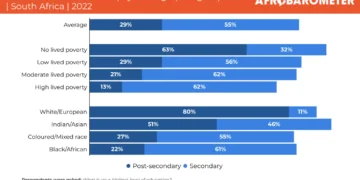The launches pioneering new ranking highlighting the strongest universities in Sub-Saharan Africa
Times Higher Education’s Sub-Saharan Africa University Ranking
The University of the Witwatersrand, in Johannesburg, South Africa, has topped Times Higher Education’s (THE) inaugural Sub-Saharan Africa University Rankings.
The public institution, more commonly known as Wits University, celebrated its centenary last year and has Nelson Mandela amongst its alumni and now becomes the first university to top THE’s innovative new ranking.
The second highest ranked university is University of Johannesburg in South Africa and in third place is Muhimbili University of Health and Allied Sciences, in Tanzania.
Four of the top 10 universities are from South Africa and two are from Tanzania.
Top 10 Sub-Saharan Africa universities
University of the Witwatersrand
– South Africa 1
University of Johannesburg
– South Africa 2
Muhimbili University of Health and Allied Sciences
– Tanzania 3
University of Pretoria
– South Africa 4
Makerere University
– Uganda 5
University of the Western Cape
– South Africa 6
Covenant University
– Nigeria 7
UGHE – University of Global Health Equity
– Rwanda 8
Ashesi University
– Ghana 9
Ardhi University
– Tanzania 10
The pioneering new ranking highlights the strongest universities in Sub-Saharan Africa across a comprehensive range of performance indicators covering five pillars: ‘access and fairness’, ‘Africa impact’, ‘teaching skills’, ‘student engagement’ and ‘resources and finance’.
SIMILAR ARTICLES: Education in Africa
Phakeng tasks stakeholders on Africa Education Medal 2023
Rebuilding Nigeria’s Educational Foundation: Will State Of Emergency Help?
The Sub-Saharan Africa University Rankings, produced in partnership with Mastercard Foundation, ranks 88 universities from 17 countries in the region.
Nigeria has the most universities in the ranking with 37, followed by South Africa with nine, Ghana and Kenya have seven each and Somalia and Uganda have five each.
The ranking provides a rich source of data on the differences between public and private universities. Of the 88 ranked universities, 59 (67%) are public, 21 (24%) are private not-for-profit and eight are private for-profit (9%) and seven of the top 10 universities are public.
Public universities received an average overall score in the rankings of 50 and charged students a median of £966 per year. By comparison, private institutions scored an average of 43, with not-for-profits charging £1,922 and for-profits charging £3,291 annually.
Public providers scored higher, on average, across four of the five pillars: access and fairness; Africa impact, resources and finance and student engagement. Private universities generally perform better on teaching and employability skills.
Public universities tend to have considerably more students than private ones averaging more than 18,000 students compared with an average of about 3,500 for private universities and public universities are, on average, almost twice as old (28 years) as private universities (18 years).
A key component of the ranking is a unique student survey accounting for their experiences, which shows students in private universities are generally more satisfied with their experience compared with their public counterparts when judging the facilities, their Interaction with peers and the faculty, employability, course quality and teaching engagement.
Phil Baty, Times Higher Education’s chief global affairs officer, said:
“This unique pioneering ranking, which was developed specifically for, and led-by, African education organisations, marks a really significant moment for higher education in the continent.
“It clearly demonstrates the broad and diverse strengths of a wide range of universities and numerous previously unknown differences between public and private universities, which is further illuminated by the results from the student survey.
“We hope this ranking will help African universities celebrate and showcase good practice, benchmark themselves against peers, and identify key areas where they can improve. Collectively, we hope it helps universities to collaborate to address the challenges the continent faces.
“We also hope the ranking will be a valuable tool for the millions of parents and prospective students who are increasingly looking for authoritative information about what a university education will give them.”
THE’s Sub-Saharan Africa University Rankings 2023 were officially announced at the organisation’s first forum in the region, THE’s Sub-Saharan Africa Forum 2023, which took place in partnership with Ashesi University on Monday 26 June 2023.
SIMILAR ARTICLES: 10 Education Facts That May Interest You This 2023
Why exams are not the future of education
Technology and Education
FROM:www.timeshighereducation.com PHOTO: www.premiumtimesng.com





































































 EduTimes Africa, a product of Education Times Africa, is a magazine publication that aims to lend its support to close the yawning gap in Africa's educational development.
EduTimes Africa, a product of Education Times Africa, is a magazine publication that aims to lend its support to close the yawning gap in Africa's educational development.

